Web hosting, domain names, and content are essential to building and operating a website. Hosting services offer the infrastructure and resources you need to create and manage a website, making it accessible online.
There are six different types of web hosting services available today.
- Shared Hosting
- Dedicated Server Hosting
- Virtual Private Server Hosting
- Cloud Hosting
- Managed Server Hosting
- Colocated Hosting
These crucial services enable you to develop a reliable web presence with benefits including speed, security, support, and cost-efficiency.
In this article, we explore different types of web hosting to help you determine which best suits your needs.

Table of Contents
1. Shared Hosting
In shared hosting, your website shares basic infrastructure and server resources with other websites. The common pool of shared resources includes processing power (CPU), memory (RAM), bandwidth, and storage space. All the websites utilize a single web server that’s live on the internet.
The number of websites on a shared package can range from a few to hundreds of sites. Typically, you have a limit on the amount of server resources you can use. The specific package defines this limit.
Under the shared hosting model, operational and maintenance costs are shared between the clients on the server. Some packages allow you to set up multiple sites under one account, provided you don’t exceed the stipulated limitations.
The service provider handles the installation of server software, server monitoring, security, system upgrades, technical support, and other backend tasks.
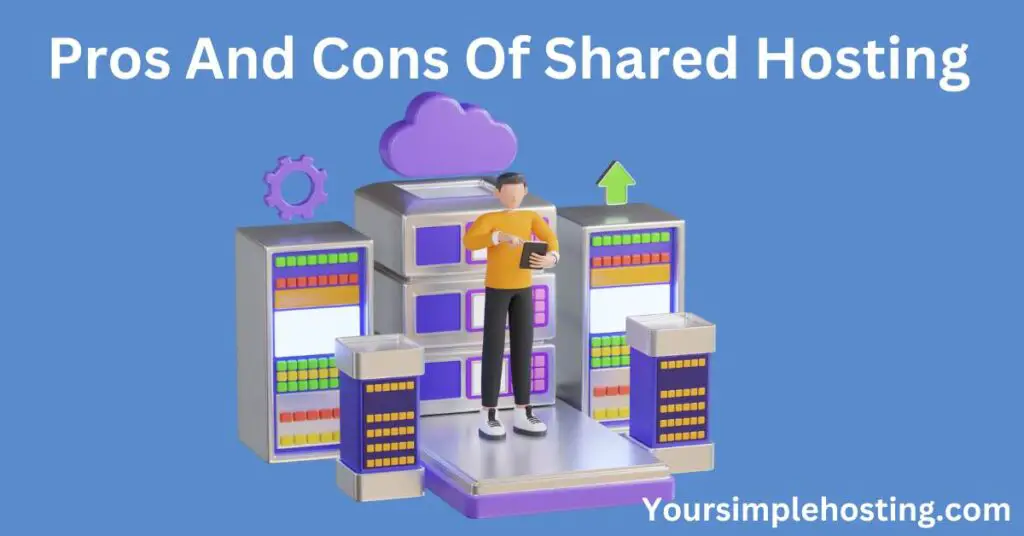
Pros of Shared Hosting
One of the main draws of shared hosting is that it’s the cheapest type of hosting available. Since it involves numerous websites leveraging the resources of a single server, providers can offer very low prices. Not everyone has the budget to rent out dedicated servers.
It is also a highly accessible option, especially if you’re starting out. Anyone can sign up, create an account, and set up a website. It is a viable solution if you run a small business operating on a tight budget.
Shared hosting has some degree of scalability. Web hosting companies offer different levels of services. If your web traffic increases, you can upgrade to a higher-tier package to access additional resources.
Lastly, it’s a user-friendly option. You don’t require technical knowledge or experience in web development and design. The service provider is responsible for all the configuration and maintenance tasks on the server end.
You only have to set up and run your website from a central control panel. Most companies provide installable “one-click” scripts and support staff to simplify this process.
Cons of Shared Hosting
The main drawback of shared hosting is a limited allocation of server resources, including bandwidth, memory, and CPU power. A spike in web traffic on one website may cause other sites to slow down. This can be the case even if your website isn’t responsible for the increased usage of resources.
Security can be a concern with shared hosting. Since you share networking infrastructure and resources, malicious activities affecting one site can easily impact others. With this option, you rely solely on the service provider for security. There’s no option to install independent security measures.
Shared hosting packages usually have many restrictions. If you don’t review the contract carefully, the provisions may blindside you. You can be prohibited from installing certain applications, plugins, and customization options.
Additionally, service providers can lock you out of your account for various reasons. These include out-growing your allotted resources or if your website attracts malware or spam.
2. Dedicated Server Hosting
Dedicated server hosting is a flexible option where you rent out one or more servers you don’t share with anyone else. It provides full administrative access and control of the web server, including hardware, operating systems, and databases.
There are no limitations on how you can use and manage server resources. With dedicated hosting, you can configure the web server according to your specific needs without interfering with other users.
It is the ideal hosting solution if your website requires high performance, reliability, security, customization, and scalability.
Websites that commonly use dedicated hosting services include:
- High-traffic websites
- E-commerce platforms
- Websites that require enhanced security
- Websites requiring high levels of control or customization
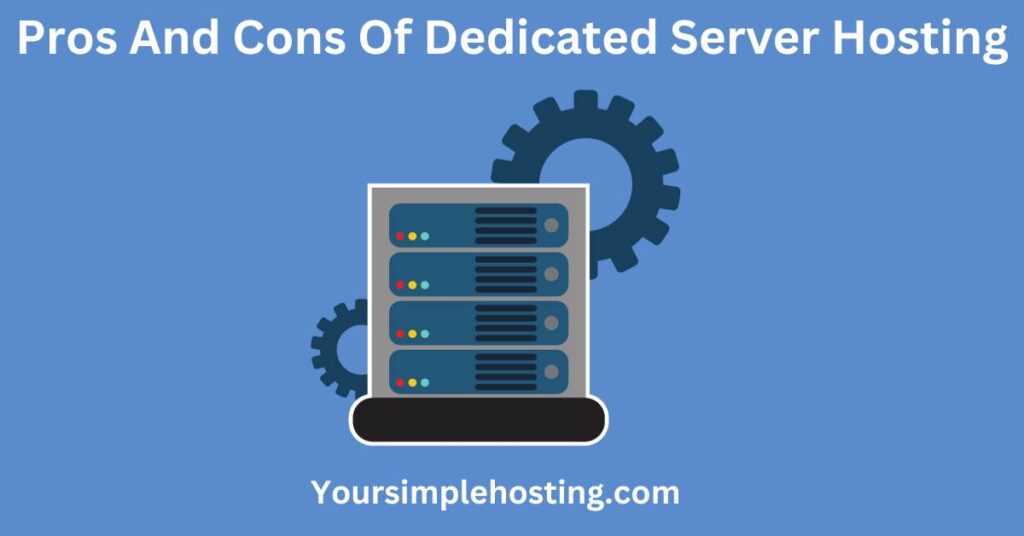
Pros of Dedicated Server Hosting
The main benefit of dedicated hosting is that you have complete control of the server. You can select the operating system, database types, content management system, and more. You can also perform system upgrades, configure security options, and other changes to suit specific requirements.
It is also a high-performance option. Since you take full advantage of a dedicated server’s resources, your website can handle large amounts of traffic. Your visitors benefit from fast loading times, smooth operation, and low latency.
Dedicated server hosting is also secure and reliable. You can restrict server access and install independent security software. You also avoid the security concerns associated with sharing server resources. It’s a highly reliable option since you don’t share resources with sites and applications that can affect performance and cause slowdowns.
Dedicated hosting offers an unmatched level of customization. As such, you can set up very specific web configurations. Some companies even offer the choice of custom-built servers in their data centers.
Service providers also offer premium customer support for dedicated hosting packages. You get access to technical staff to assist you with any backend issues.
Cons of Dedicated Server Hosting
The primary disadvantage of dedicated server hosting is cost. The packages are typically more expensive than other types of web hosting. It also requires a high level of system administration responsibility due to the increased complexity of infrastructure deployment.
You are responsible for the web server’s configuration, maintenance, and security. As such, you must be knowledgeable and experienced in the technical aspects of web hosting and development. Service providers offer different levels of server administration and maintenance as add-on services.
However, these services come at an additional cost. Furthermore, you may incur a penalty with some dedicated hosting packages if you cancel before the contract term ends.
3. Virtual Private Server Hosting
Virtual Private Server (VPS) hosting is an option where you have access to an independent virtual environment on a physical server sold as a service. The high-performance server hosts multiple websites, but your site has its own dedicated resources, including the operating system.
You have root access to the virtual machine. This means you can install any software compatible with the OS and customize the server to meet your specific needs.
It is similar to dedicated hosting but uses partitioned virtual spaces with the functionality of a physical server. You only share the underlying physical hardware with other VPSes. VPS hosting is the ideal choice for specific scenarios, such as:
- Your website has a high traffic volume and requires more system resources.
- Your needs go beyond simply having an online presence.
- You have specific performance and speed requirements.
- You run web programs that require more control over the web server.
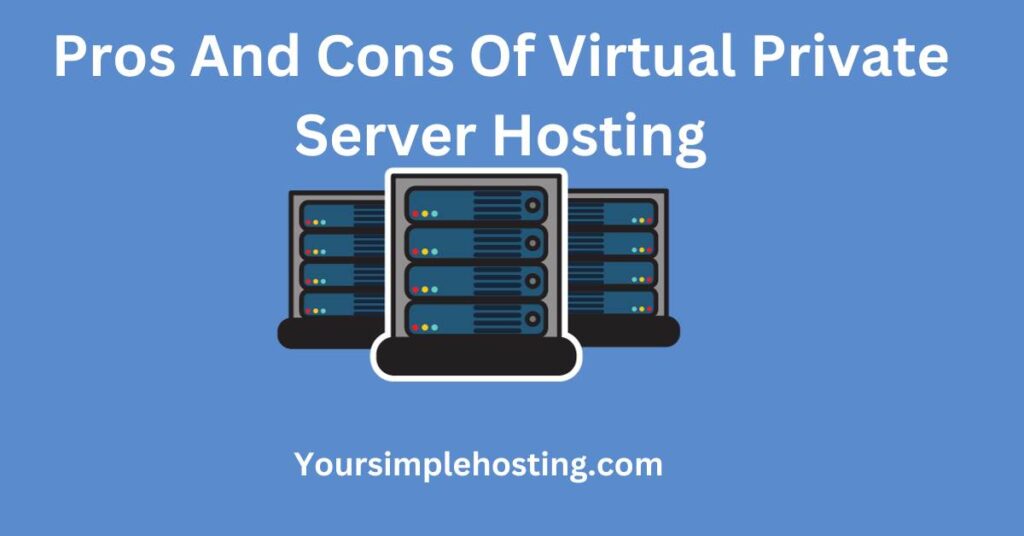
Pros of Virtual Private Server Hosting
- Control – A flexible option offers complete control over the hosting infrastructure and resources. You have administrative access to the virtual server, which runs its own fully-fledged OS. You can perform system-level changes like installing your preferred software and applications and adding user accounts. VPS hosting also allows you to manage server resource allocation.
- High performance – The services rely on high-end servers that ensure websites are fast and responsive with maximum uptime. The servers feature powerful processors, faster memory, more storage, and higher bandwidth capabilities. These resources are efficiently allocated to your dedicated virtual machine to leverage them as per your needs.
- Security – Your virtual machine is isolated from other servers. Security issues affecting other VPS don’t affect you. The service includes all the basic and advanced security features.
You can install your own security software on the virtual server OS. You can also add and control user access and monitor your hosting environment.
- Cost-effective – It’s a budget-friendly alternative to dedicated hosting. It provides almost the same features and control options at a fraction of the cost. While it isn’t as cheap as shared hosting, VPS packages are affordable for small businesses and individuals.
- Scalability – you can increase the allocation of resources to your virtual machine as per your needs. For instance, if your web traffic increases, you can increase processing power, bandwidth, and storage to match.
Cons of Virtual Private Server Hosting
- Requires technical knowledge – You need considerable technical know-how and web development experience to leverage VPS hosting benefits. Your website’s capabilities will be hampered if you lack the expertise and skillsets to configure and maintain your virtual server properly.
- Self-management – You are responsible for maintenance, software, and security updates and ensuring your VPS operates smoothly. Service providers may provide administrative services (managed servers) at an additional cost. This adds to the overall higher cost of VPS hosting compared to the other options.
- Hardware sharing – Virtual machines still share physical hardware. As such, you may experience performance dips depending on the workload of other VPSes.
4. Cloud Hosting
Cloud hosting is a newer type of service based on a large cluster of load-balanced virtual servers or cloud resources. The servers reside on high-end hardware in data centers spread across a large geographical area. The functions of the servers are distributed over these locations.
Your website shares these decentralized computer system resources, including processing power and data storage. Cloud hosting serves multiple clients, with virtual and physical resources assigned dynamically based on consumer demand. It employs various forms of pay-as-you-go service models. Cloud hosting is an ideal choice if:
- You run a high-traffic website where stability and reliability are critical.
- Website downtime is detrimental to your operations.
- Continuity is vital to your business.
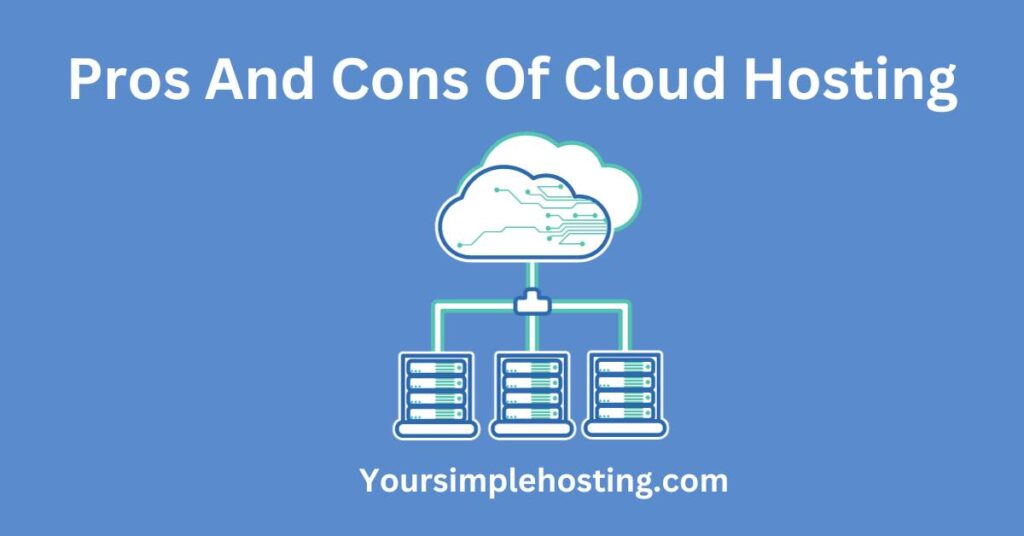
Pros of Cloud Hosting
- Reliability– Since multiple servers are employed simultaneously in a hosting configuration, your website benefits from fail-over technology. In case of any hardware/software issues, your website’s functionality is maintained while it’s moved to other servers on the cloud.
- Backup and disaster recovery – The services are unaffected by unexpected factors such as power outages, natural disasters, network failures, and human errors. A significant value proposition for cloud hosting is that it allows you to plan for operational continuity. It offers data redundancy, which makes losing data highly unlikely.
- High performance – Sharing computing resources makes cloud hosting a very high-performance service. When you choose a reputable provider, you can expect elite-level website performance. You benefit from fast loading times, responsiveness, increased bandwidth, and maximum uptime.
- Security – Cloud-based services feature a robust security framework. Service providers have to adhere to stringent data protection regulations and standards. As such, they implement strict security protocols, including encryption, to protect cloud architecture and databases against all threats.
- Scalability -This type of web hosting offers the highest degree of scalability and flexibility. Depending on your website’s needs, you can rapidly scale your cloud hosting capabilities upwards or downwards.
Cons of Cloud Hosting
- Limited control – The main drawback of cloud web hosting is reduced visibility and control. You don’t have complete insight into how service providers configure, optimize, and manage computing resources. Your ability to customize or modify cloud infrastructure based on specific needs and preferences is also limited.
- Requires reliable Internet connection – Cloud hosting requires a fast and reliable Internet connection and good bandwidth. You can’t fully leverage cloud services without a consistent internet connection.
5. Managed Server Hosting
Managed web hosting is similar to dedicated servers in that you rent out an entire web server. However, the service provider handles certain aspects, including setup, configuration, administration management, and technical support on your behalf.
Typically, you are denied administrative access to the server. This guarantees service quality by preventing user interference that may create problems. Managed hosting is an ideal choice if you have a large website with a high traffic volume but have limited technical knowledge.
No industry standards define the exact management roles of service providers. As such, every company will determine the services differently. Generally, managed hosting services cover the following services:
- Operating system support
- Server monitoring
- Software configuration, monitoring, and updates
- Application management
- Security management
- Database Administration
- Backup and disaster recovery
Note that some service providers have dedicated system staff ready to handle all server-related functions.
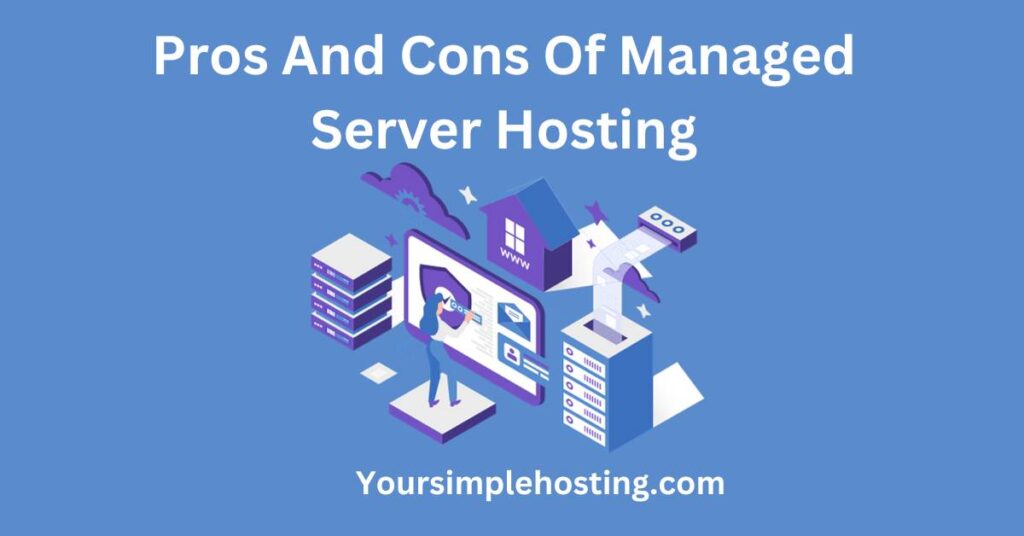
Pros of Managed Server Hosting
A significant benefit of managed servers is convenience. You don’t have to worry about management, maintenance, and optimization since you outsource these tasks to the hosting company. This saves you valuable time and allows you to focus on other aspects of your operations.
You don’t require any technical knowledge or experience in web development. Service providers have a team of experts to manage all your website’s backend aspects. It eliminates the need for an in-house IT team.
Outsourced services are also highly reliable. Reputable companies have service-level agreements that guarantee your website will be continuously available. The service provider monitors all operations to ensure maximum uptime.
Managed hosting is secure. Service providers have well-established security strategies to protect their infrastructure and customer data. You have access to the latest security features, updates, and system patches that bolster security.
The packages also feature backup and recovery services. The service provider handles all the backup and disaster recovery tasks. In case of a problem, you can recover and be up and running quickly.
Cons of Managed Server Hosting
Managed services offer limited control over the web server. Since the service provider manages all web-hosting aspects, you won’t have root access to the server. You have to deal with customer care to enact any backend system changes.
Naturally, managed services cost more than self-managed options. You are paying more to take care of all hosting aspects on your behalf. If you are operating on a tight budget, this may not be an ideal option for you.
6. Colocated Server Hosting
In colocated server hosting, you rent out physical space and bandwidth for your web server at a colocation center. This facility is essentially a data center. It offers rack space, power, physical security, maintenance, and cooling for your server, networking, and storage equipment. Colocation services also enable you to connect to network and telecommunications service providers.
Typically, the service provider doesn’t provide direct support for your machine. They only offer electricity, storage, and internet access facilities. You often must send an administrator to the data center for hardware changes or upgrades. Colocation service providers today require standard system configurations and rack mount enclosures.
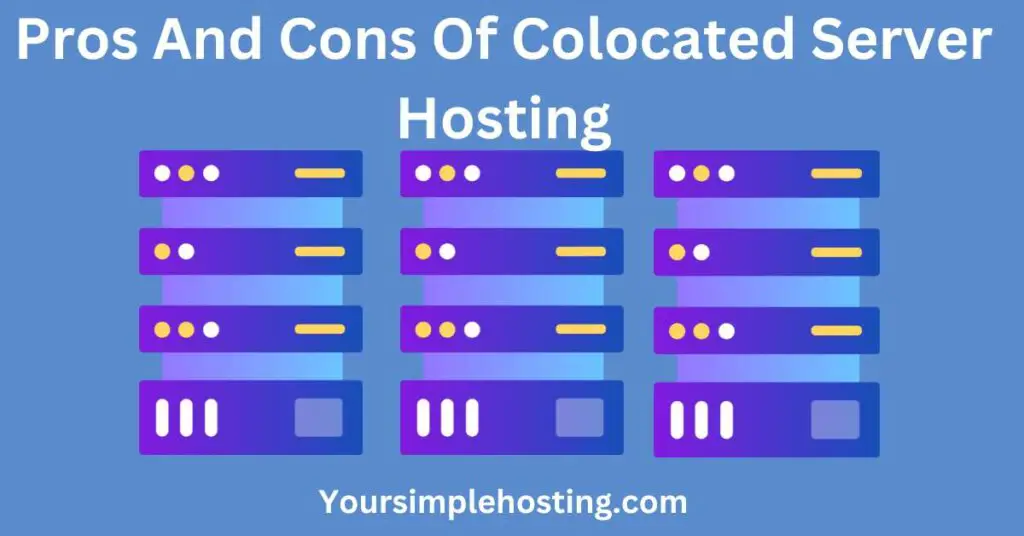
Pros of Colocated Server Hosting
Colocated hosting is one of the most powerful web hosting services, partly due to temperature-controlled environments. The facility protects your server against temperature fluctuations. As such, you can squeeze the most performance out of your hardware.
It also offers a high degree of control over your hardware and software. Since you own the server, you can upgrade it as per your needs. You can also install and updates software without relying on the service provider.
The hosting company may provide additional services in case of an uptick in activities or major system upgrades.
With colocation, you have access to more bandwidth since colocation services allow you to transmit more data. The services include outage protection to protect your data and ensure operational continuity.
Colocated service providers have invested in UPS technology and backup power generators to mitigate power outages.
Cons of Colocated Server Hosting
The main disadvantage of colocated hosting is that it requires significant start-up capital. It is among the most expensive types of web hosting service since you are not renting the servers.
There are also commuting costs to consider. In case of any maintenance needs, your server administrator will have to travel to the colocation center.
Finding a reputable colocation data center within a convenient distance may be challenging, depending on where you reside. A facility nearby is crucial since you must visit the data center.
Final Thoughts
Overall, we cannot overstate the importance of a good hosting service. It is a fundamental aspect of any online project as it ensures your website is available and accessible for viewing worldwide.
Your specific needs and preferences should determine the type of hosting service you choose. The most important considerations include speed, security, uptime, bandwidth, storage, and customer support. Lastly, it’s equally if not more important to enlist the services of a reputable and reliable web hosting provider.

Leave a Reply